Once out of the main tar roads, Angola is a very pretty and quiet countryside. Luckily not spotted by anyone at my camping spot, I can enjoy a lazy morning. I really need some rest since I have been cycling for 20 days in a row now. Twenty days are my longest time without taking a day off. My ankle wounds won’t heal and my thighs are flat of energy even during the first minutes of the day. The problem is that I want to rest for a few days in a place with electricity and shops nearby, but without paying 100 USD per night. And these conditions are hard to satisfy in Angola. As a result, I have been continuously moving on, camping in the bush and hoping to make a break soon.
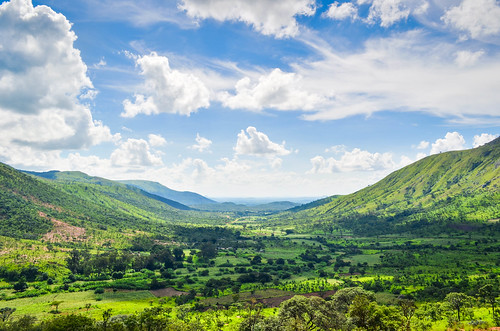
I continue on my dirt road until Caluquembe. Without energy in the legs, it doesn’t even take 10 km before I stop for my first Coca-cola break, exceptionally a Sprite break due to poor stock. As usual, the kids come to watch me, they are pulled away by some adults, who in turn gossip about me in front of me. One of them, not asking me any questions but explaining my life to his friends, is saying that I cycled from Brazil to Angola, highlighting not only poor manners but also a great lack of general knowledge.
It is hard to find a national who has been out of Angola. I have met one English speaker who had been in a Zambian refugee camp for four years. In the north, some had studied in Kinshasa during the civil war. But that’s it.
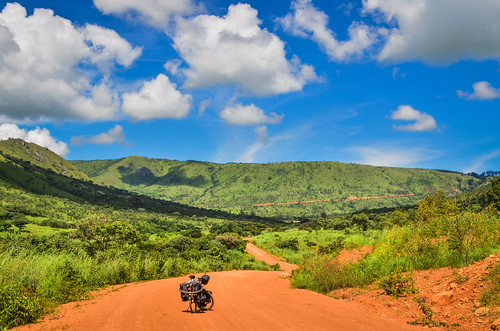

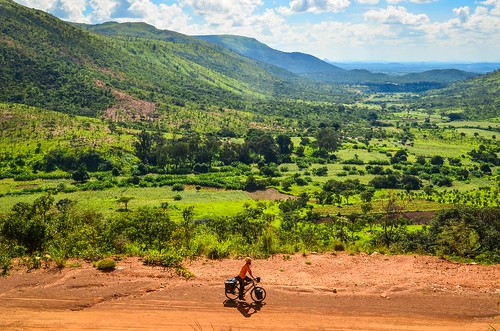
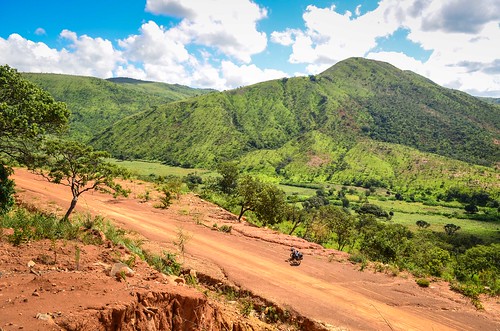
With the heat and deflated legs, that ascent to Chicuma is painful. Halfway through it, I am glad to stop and take photos, as the scenery is remarkably beautiful.

Naturally, considering the luck I have with the police and their absurd need to control everything, one policeman had followed me and intercepts me in the slope. He is not wearing a uniform and has forgotten his badge at the office, so it looks for me like a random motorbiker asking questions. “I am the police head for the past village. I saw you passing. Who authorized you to cycle through my village? Who authorized you to take pictures here?“. Pffff …. it always happens. I am tired of explaining that I have a tourist visa, valid even in his village, and that taking pictures of mountains, of my bicycle and of myself is not a crime for a tourist. I am only speaking English and challenge the fact that he can ask me for papers. Not speaking Portuguese make things faster. I know I am not doing anything wrong, but I also know that the police will ask for my passport and a bunch of stupid questions, just because they can and because they have never seen a White man on a bike before. In the end, he shows me his gun to prove he is a real policeman, and asks me to report to the police station of Chicuma. The Angolan population is very friendly, but the authorities are really paranoid …
I meet my 21000 KM milestone on this very slope. I had been for a few days above 1000 m, and now that I am going slightly more inland, towards Lubango, it goes even higher. The plateau of Lubango is around 1700-1800 m.
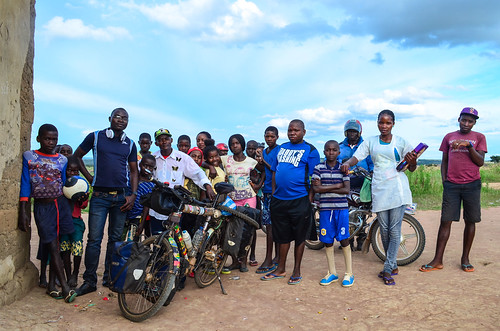
At the end of the scenic uphill, I am, as expected, intercepted by the police station. They can’t speak any word of English, and I act like if I didn’t understand Portuguese: I can hear they are brainstorming on how to ask in English for the name of my parents, on the fact that they should keep me at the police station because it is night in two hours, etc … and am glad they can’t say any of these in English and have to hold their noses to let me go.
Between Chicuma and Caluquembe, the road is much worse. I camp in the woods near the corn fields of Kareti … they are only corn fields here, and people only eat funge de milho. No more cassava! No more bâtons de manioc! North of Angola has cassava, but not the south. It is the end of an era … the food I have been eating for almost a year is not grown anymore.
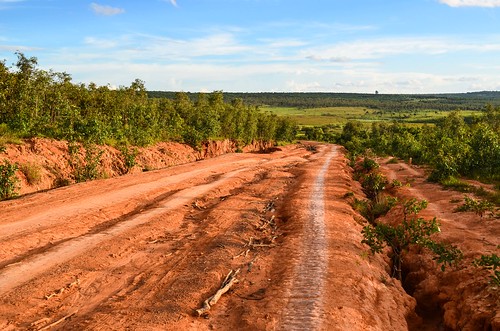

I am now in the routine of rural Angola cycling. Nothing special happens. Police, corn fields, dirt roads, ruins, chit chats, coca-cola breaks, people watching me, people talking about me …
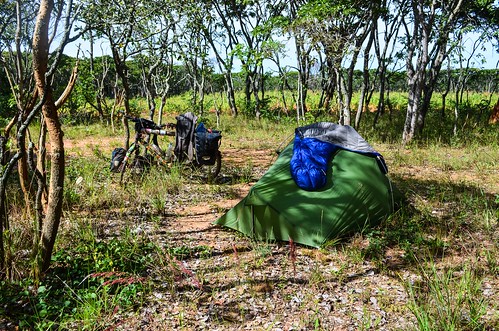
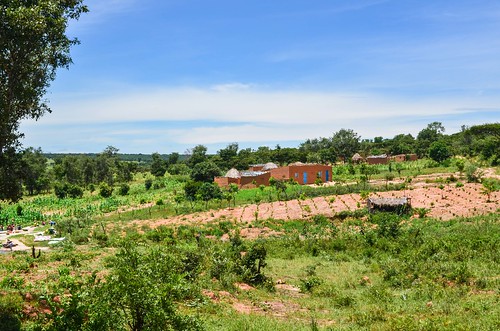
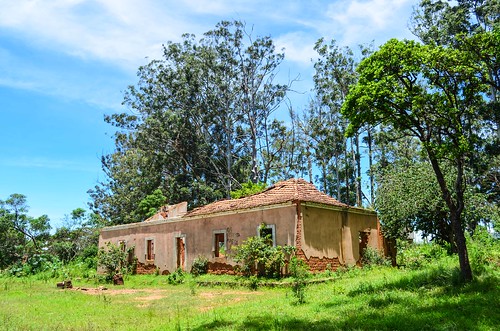
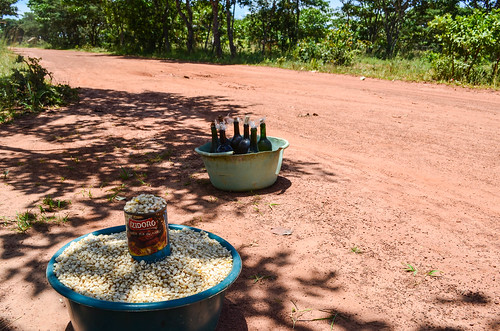
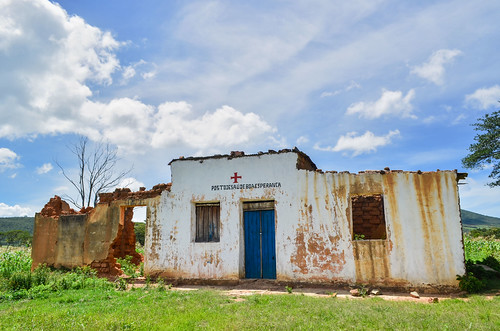
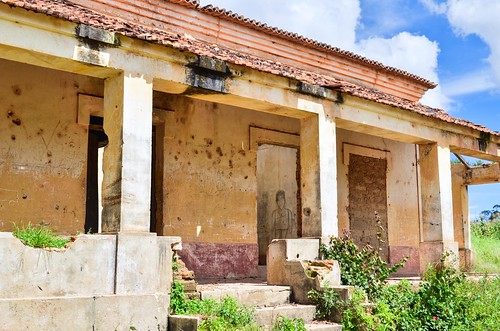
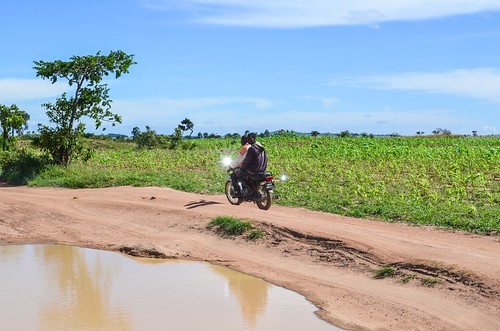
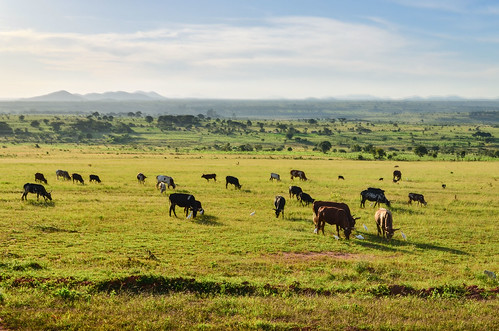

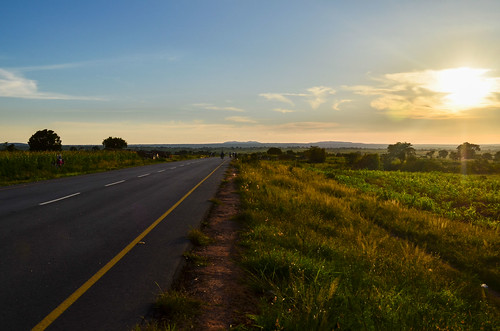
After 70 km, it is time for another camp spot, in the corn fields again.
Camping in Angola is great: plenty of flat land relatively dry, enough grasslands to pitch a tent without much hassle, plenty of sun, plateaux with fair temperatures to wake up and enjoy the sun rays naked, and fresh air.
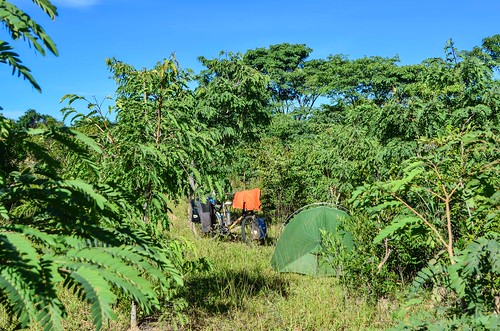
Villa Branca is the first hamlet on my main road to Lubango. I arrive at the road side market just when a lady shows up with delicious oily donuts, so I make a heavy breakfast of it with a Sprite. Nothing special I agree, until I sit under the thatched roof.
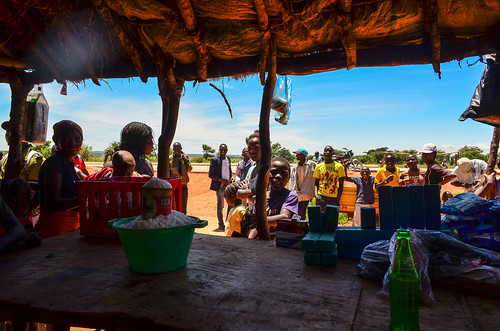
A crowd starts gathering in front of me. Kids and adults are watching the White man eating at their market. They are arguing together whether I’m a Mulatto (mixed) or a Chinese. I hear the most ignorant comment I have ever heard.
“No, he can’t be a Mulatto, Mulattos don’t ride bicycles“。
“He’s not a Chinese for sure, look at his nose! Chinese don’t have this kind of nose“。
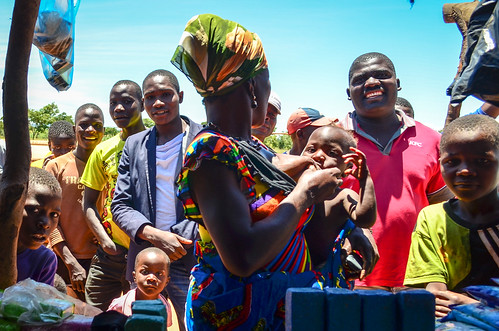
Of course, they won’t ask me any question, they just make hypotheses. The loudest one is considered as being right. As I have told my story hundreds of times, I don’t intervene and let them chat. By now I am used to be called “中国語“. I doubt there are that many places in the world where I look Asian.
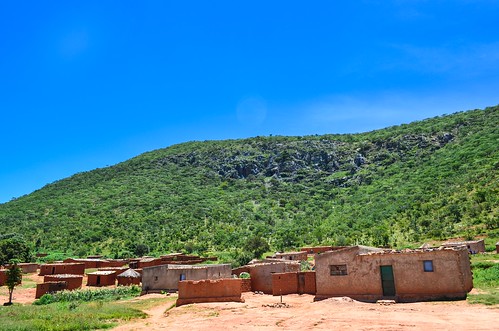
The road is all paved until Cacula where I stop for the night.
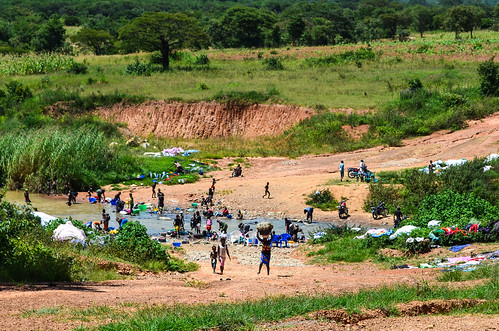
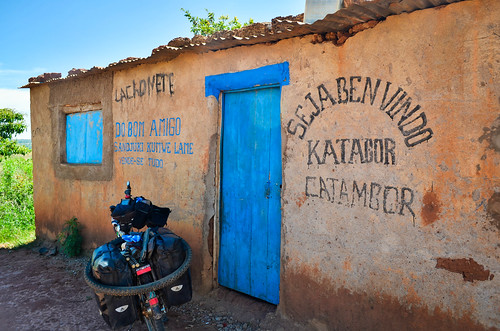

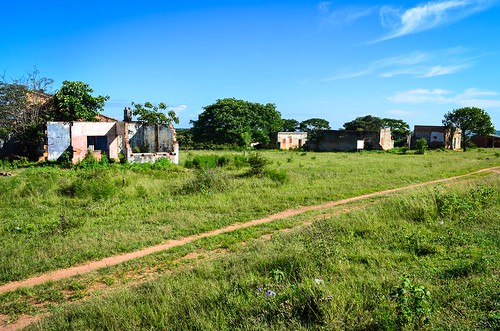
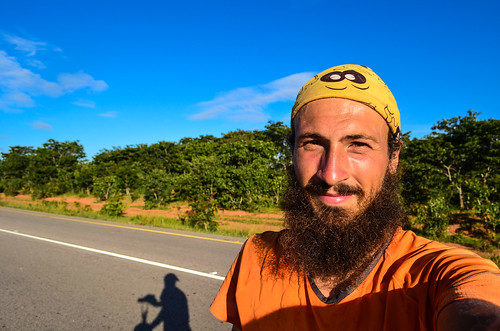
I leave the tar road for small tracks into the corn fields for pitching my tent. As I pass through a small village, I decide to stop and tell the villagers that I am just going to camp a bit further, so that they don’t look for me during the night thinking I’m a bandito or just by curiosity.
They suggest I sleep in the veranda of the house at the center of the village, surrounded by kids and dogs. I decline the offer, as at this point of the trip, I have had enough interactions to prioritize my sleep quality over learning new things from the locals. I’ll be better in the bush. Especially when the chefs asks for money (actually quite rare for Angola) while a totally drunk man arrives with undecipherable words.
In the morning, I have to cycle back to the road crossing the same village. The chief is more drunk than in the evening. I’m sure the current peaceful situation of Angola owes a lot to alcohol consumption.
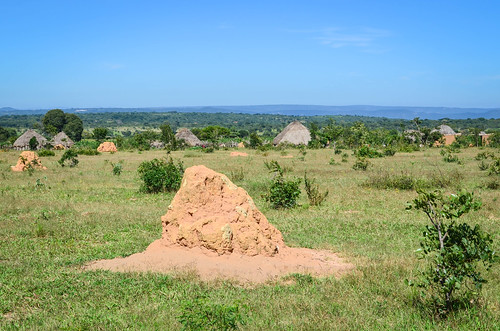

There’s no food for 40 kilometers. The small shops and cantinas only have bolachas (dry tasteless cookies mostly made in India). So often, when I stop somewhere and say “I’m hungry, what’s there to eat?“, I am automatically replied “bolachas and sardinas“. These things don’t deserve to be called “food”, even less than the “cassava and sardines” systematic answer I hated to hear in Gabon. Definitely, cuisine is a word reserved for West Africa.
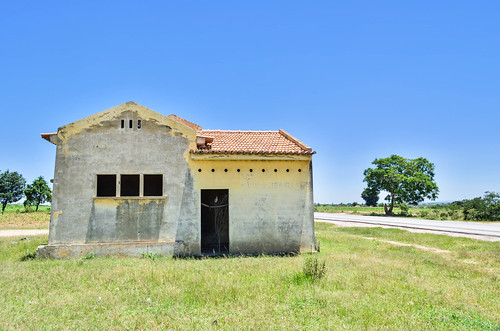
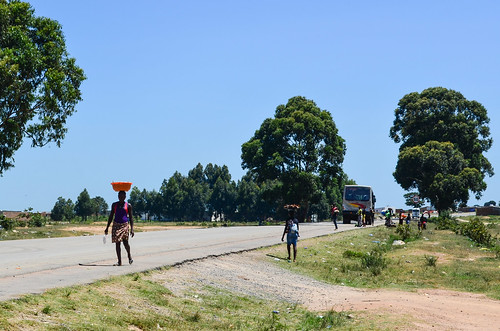
I had a talk with another cyclist, Dave, and realized something about food: there are days and times of the day I am not in a good mood. I would not engage in conversations and not take up the bullshit of people with a smile. Reasons for it are mostly: bad sleep (dogs, roosters), and empty stomach. We are both grumpy when we really need to eat.
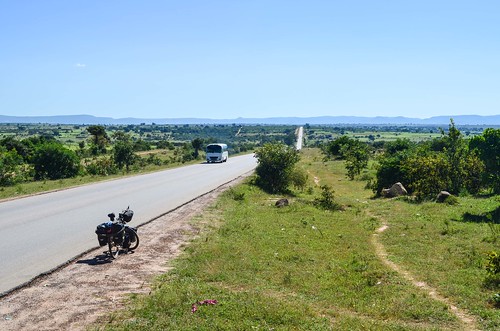
My objective for the day, Lubango, is in sight. When the road is straight and uneventful, I can keep up with a regular rhythm of 17-18 km/h and forecast my arrival time. I stop in another bairro for another Coca-cola break. The cantinas and shops are busy this Sunday after church (where the service can last up to four hours) since Sunday means “church + get drunk” day. I chat with an old man who doesn’t know what France is. “Oh it’s a country. Is it close to Cuba?“、“Is Cuba close to Soviet?“. Some people only know four countries in the world: Soviet, Cuba, China, and Portugal. The countries which made (and are making) Angola’s history.
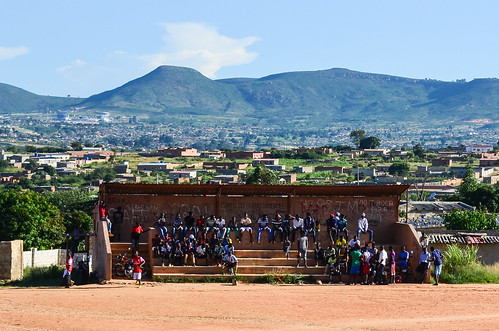
Lubango is warm despite a 1800 m elevation. It looks like a nice city at first, it is sometimes called the most beautiful city of Angola. It is part of the top 10 largest cities and is the largest one I will be visiting.
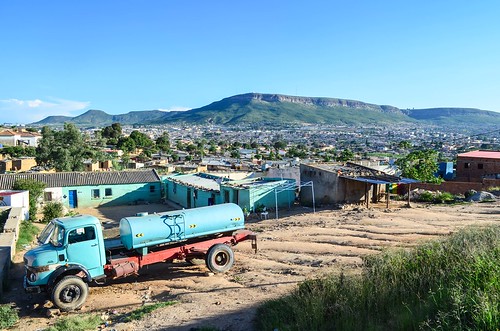
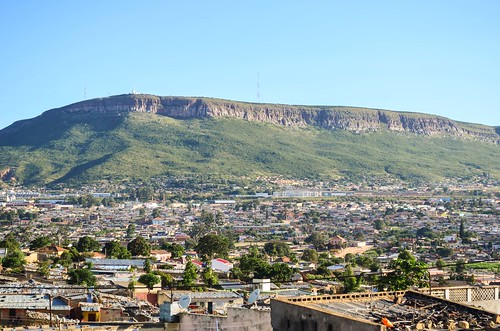
Augusto from Balombo suggested that I ask for hospitality at the catholic mission. That’s what I do, but almost quit: the seminarians make me wait in the hall, and then nothing. I am tired and freezing, smelly and demotivated, and about to go and look for another place at 10 pm after four hours of waiting. There is a party in the next compound and they forgot about me. Padre Texeira finally shows up and I am offered a room: that cumbersome introduction is actually the start of a great time in Lubango with nice people. I will finally be able to rest. And the surroundings of Lubango are just confirming Angola is competing for the most beautiful African country. Carnaval is also coming up soon!






Merci 🙂
Beautiful photos. A great post.